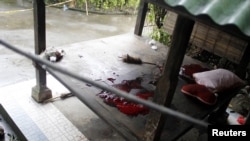JAKARTA — There has not been a major terrorist attack in Indonesia since the Bali bombings in 2002, but that does not mean the threat does not linger. An International Crisis Group report suggests terrorists are regrouping in increasingly sophisticated ways.
The report describes terrorist networks in Indonesia as weak, divided and even somewhat inept in recent years. But it also points to rising activity on radical websites and chat forums, and increasingly sophisticated methods of fundraising.
In June, for example, police arrested a suspected terrorist with more than $800,000 they believed was obtained through online hacking.
ICG terrorism analyst Sidney Jones says these signs show jihadist inclinations flourish in some parts of Indonesian society.
“One of the things that this report points out is how easy it is for people who are being hunted by police to find new allies, to get arms and ammunition, to travel around the country and to actually plan an operation, even if so far they have not been very good or very professional at carrying them out," Jones said. "The point is the danger is not gone, however good and calm the situation may be at the moment, in fact there is still a possibility that terrorist attacks can occur in Indonesia.”
The discovery of a militant training camp in Aceh, North Sumatra, in 2010 was a huge blow to terrorist networks operating in the country. But Jones says more than 200 arrests has inspired a desire for revenge in other hardliners.
The report suggests extremists are becoming increasingly savvy about vetting members and more secretive about the way they operate.
And International rights groups have emphasized a growing trend of religious intolerance in Indonesia over recent months.
In June, a concert by flamboyant U.S. pop star Lady Gaga was cancelled after pressure from hardline groups - as was a book launch by Canadian feminist author Irshad Manji. In the same month, a Sumatran man was jailed for allegedly promoting atheism and denigrating Mohammed.
Jones says vigilante groups like those behind some incidents could serve as a stepping-stone to more violent extremism.
“I think that one of the areas for the government to make any moves on is actually community awareness programs, because actually everyone is so aware of stigmatizing Islam or there is a genuine concern that the lines will be drawn in such as a way that some of the civil liberties restored after [former president] Suharto fell will be restricted again in the name of combating extremism. And that is a concern and that is something the government has to deal with, but we are seeing a complete passivity on this issue of addressing radicalization at the roots,” Jones said.
In the lead up to the holy fasting month of Ramadan that begins this Friday in Indonesia, human-rights activists have also challenged the willingness of police to prevent hardline groups from their routine of raiding nightclubs and restaurants.
The report describes terrorist networks in Indonesia as weak, divided and even somewhat inept in recent years. But it also points to rising activity on radical websites and chat forums, and increasingly sophisticated methods of fundraising.
In June, for example, police arrested a suspected terrorist with more than $800,000 they believed was obtained through online hacking.
ICG terrorism analyst Sidney Jones says these signs show jihadist inclinations flourish in some parts of Indonesian society.
“One of the things that this report points out is how easy it is for people who are being hunted by police to find new allies, to get arms and ammunition, to travel around the country and to actually plan an operation, even if so far they have not been very good or very professional at carrying them out," Jones said. "The point is the danger is not gone, however good and calm the situation may be at the moment, in fact there is still a possibility that terrorist attacks can occur in Indonesia.”
The discovery of a militant training camp in Aceh, North Sumatra, in 2010 was a huge blow to terrorist networks operating in the country. But Jones says more than 200 arrests has inspired a desire for revenge in other hardliners.
The report suggests extremists are becoming increasingly savvy about vetting members and more secretive about the way they operate.
And International rights groups have emphasized a growing trend of religious intolerance in Indonesia over recent months.
In June, a concert by flamboyant U.S. pop star Lady Gaga was cancelled after pressure from hardline groups - as was a book launch by Canadian feminist author Irshad Manji. In the same month, a Sumatran man was jailed for allegedly promoting atheism and denigrating Mohammed.
Jones says vigilante groups like those behind some incidents could serve as a stepping-stone to more violent extremism.
“I think that one of the areas for the government to make any moves on is actually community awareness programs, because actually everyone is so aware of stigmatizing Islam or there is a genuine concern that the lines will be drawn in such as a way that some of the civil liberties restored after [former president] Suharto fell will be restricted again in the name of combating extremism. And that is a concern and that is something the government has to deal with, but we are seeing a complete passivity on this issue of addressing radicalization at the roots,” Jones said.
In the lead up to the holy fasting month of Ramadan that begins this Friday in Indonesia, human-rights activists have also challenged the willingness of police to prevent hardline groups from their routine of raiding nightclubs and restaurants.





